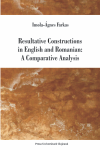| REZUMAT: |
It is a well-established concept in modern linguistic analysis that minimal elements entering the linguistic computation can be combined in different ways, thus giving rise to different representations. Nevertheless, the inventory of language-individual representations is highly structured, each bit of grammatically pertinent piece of information interacting with the others and having repercussions on the global construction of a language. This observation is especially valid in the case of grammatically complex representations. The present work, a revised version of the doctoral dissertation, defended at Babeş-Bolyai University, Cluj-Napoca is a comparative analysis of one type of complex linguistic representation in English and Romanian: the resultative construction. |
|
